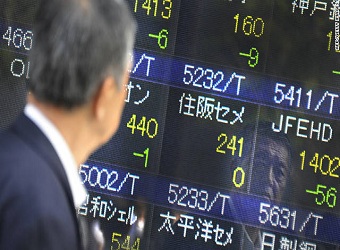In Sydney, the S&P/ASX 200 edged up 0.11 percent. Australia’s “Big Four” banks were higher on the day, with ANZ climbing 0.4 percent. Gold producers, meanwhile, declined, with the All Ordinaries Gold index edging lower by 0.47 percent- they were the worst-performing sector for the day.
South Korea’s Kospi rose 0.4 percent after earlier slipping below the flat line. Retailers, automakers and trading houses rose in the session, with Lotte Shopping adding 2.08 percent. Blue chips Samsung Electronics and SK Hynix, however, lost 0.38 percent and 2.02 percent, respectively.
Officials from the two Koreas are set to meet on Tuesday for the first time since December 2015. The talks are expected to focus on the upcoming Winter Olympics hosted by South Korea and inter-Korean ties, Reuters said, citing a government spokesman.
Greater China markets were, for the most part, little changed. The Hang Seng Index took a pause, trading 0.04 percent lower after seeing gains of 2.6 percent last week. Most property developers rose, extending gains recorded in the previous session. China Evergrande was higher by 2.97 percent and China Vanke tacked on 4.09 percent.
On the mainland, the Shanghai Composite reversed early losses to climb 0.35 percent and the Shenzhen Composite was nearly flat.
MSCI’s broad index of shares in Asia Pacific excluding Japan was higher by 0.22 percent at 12:32 p.m. HK/SIN. The index was just under its all-time high of 591.50 set more than a decade ago.
The first trading week of the year had seen Asian markets touch multi-year highs. Hong Kong’s Hang Seng Index hit its highest levels in a decade and Japan’s benchmark Nikkei 225 rose to levels not seen in 26 years in the last trading day.
Earnings releases from several Japanese corporates are expected toward the end of the week, although Samsung Electronics is set to release its fourth-quarter earnings guidance on Tuesday.
Japanese markets are closed for Coming of Age Day.
U.S. markets closed higher on Friday despite jobs data for the month of December coming in below expectations.
Just 148,000 jobs were added in the U.S. last month, according to government data, compared to the 190,000 increase projected in a Reuters poll. Average hourly earnings were higher by 2.5 percent on an annualized basis.
Still, major indexes stateside recorded gains in the last session to cap off a strong start to the year, with the Dow Jones industrial average climbing 2.3 percent last week.
On the currency front, the greenback remained on the back foot against a basket of currencies, but traded a tad firmer at 92.047 at 12:24 p.m. HK/SIN. That was slightly above Friday’s close of 92.013.
“On balance, the U.S. nonfarm payroll numbers … left the dollar (and Fed rate hike odds) none the worse for wear, but investors we think will continue to channel their attention to the other major global central banks instead,” said Emmanuel Ng, an analyst at OCBC Bank.
Against the yen, the dollar traded at 113.12.
The Australian dollar was mostly steady at $0.7864.
Meanwhile, oil was slightly firmer after slipping in the previous trading session on the back of higher U.S. production. Oil prices had soared to their highest levels since May 2015 earlier last week.
U.S. West Texas Intermediate tacked on 0.23 percent to trade at $61.58 a barrel and Brent crude futures added 0.18 percent to trade at $67.74.
In corporate news, shares of Shenzhen-listed FAW Car were up 2.15 percent. The automaker announced Sunday that it had agreed to take a 10 percent stake in Mobike Chuxing Technology, the car-sharing arm of mainland bike-sharing start-up Mobike, Reuters reported.
Other mainland-listed automakers were also higher, with Great Wall Motor up 3.38 percent on the day. Source: CNBC
Source: CNBC
